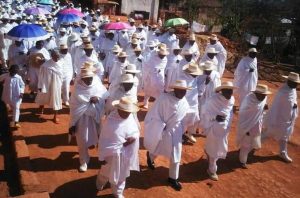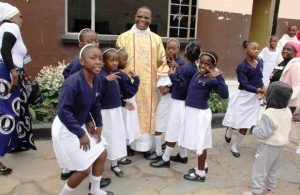As Chairperson of the Southern African Bishops Conference, he denounced the Apartheid system as “intrinsically evil”.
Denis Hurley was born in Cape Town in 1915 of Irish parents. Educated at St Charles College in Pietermaritzburg, he joined the Missionary Oblates of Mary Immaculate (OMI) and was ordained a priest in 1939. In 1947, he was named Vicar Apostolic of Natal and Bishop of Durban at the age of 31, making him the youngest Roman Catholic bishop in the world at that time, and in 1952 he became the Archbishop of Durban. He chose Ubi Spiritus, ibi libertas as his motto, which means “Where the Spirit is, there is liberty”.
Hurley was an instrumental contributor to the ecclesiastical and liturgical reforms of the Second Vatican Council which he had attended in the 1960s and regarded this as the highlight of his life. He was Chairperson of the International Commission on English in the Liturgy from 1975-1991. He retired as archbishop in 1992, becoming chancellor of the University of Natal from 1993 to 1998 while continuing to work as parish priest of Emmanuel Cathedral well into his eighties. In 2002, he retired to write his memoirs. He also spent his time writing letters to The Times debating the finer points of cricket, and composing the words for new hymns.
For almost 50 years, Denis Hurley was a courageous opponent of South Africa’s apartheid regime. The writer Alan Paton (referring to Hurley’s father’s profession as a lighthouse keeper) called him the “Guardian of the Light”.
As Chairperson of the Southern African Bishops Conference, he denounced the Apartheid system as “intrinsically evil”. In the 1970s, Archbishop Hurley was frequently seen protesting on the streets of Durban with a placard expressing his opposition to Apartheid and forced removals. In 1984, he was charged with contravention of the Police Act and placed under house arrest. He received death threats and his home was petrol bombed. The charges were dropped when it became clear that the State would be severely embarrassed by the evidence Hurley’s legal team had assembled. The State settled a claim for damages out of court, paying Hurley R25,000.
As he fought on many fronts for Justice, Hurley always claimed that his greatest struggle was to convince South African Catholics that Social Justice was an integral part of their faith and not an optional extra. He spent almost all of his adult years fighting a deeply entrenched system and even some Catholics, regarded him as a traitor. Nevertheless he persevered in living out his Missionary Discipleship calling often standing alone against the State, but he lived to see his dream and that of an entire nation realised.






